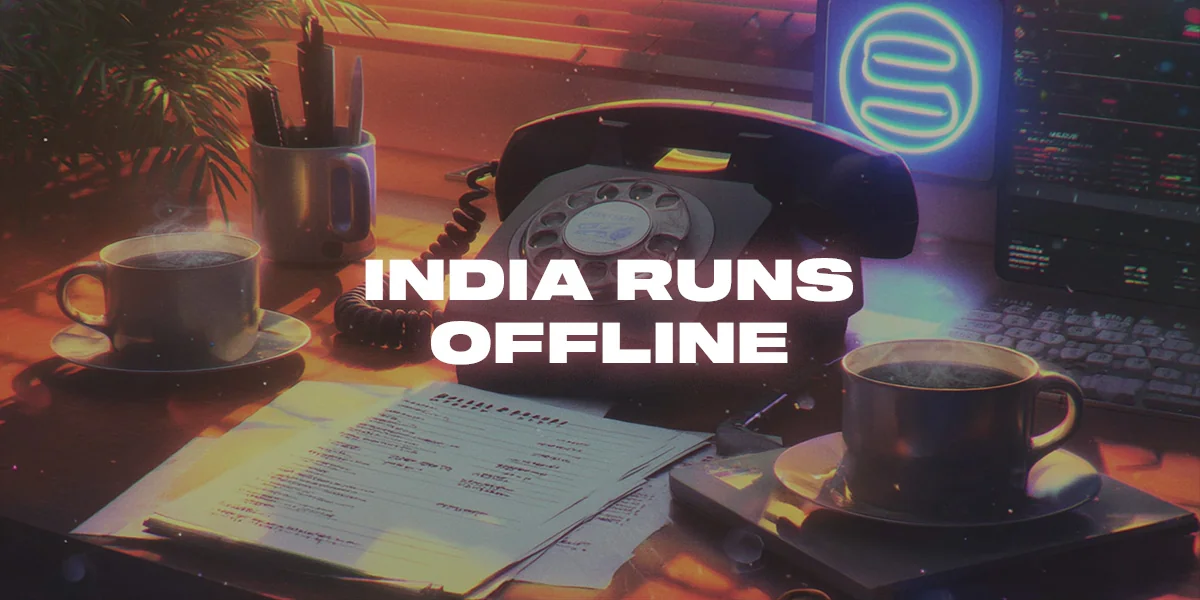Ever tried running a business in India only with Slack, dashboards, and endless apps? Good luck.
Here's the real secret: most of India's commerce happens on phone calls, handwritten ledgers, and a healthy dose of jugaad-not in the digital playgrounds Silicon Valley loves.
If you think "modern" means "more digital," this post will flip your mental model. Because in India, the human touch still crushes the algorithm.
Let's cut through the noise: Indian business is built on relationships, trust, and fast decisions. While the West chases automation, India's real operators know how to blend tradition with just enough tech. By the end of this post, you'll see why calls, paperwork, and improvisation aren't relics-they're competitive advantages.
🧠 The Oral Tradition: Trust Runs on Voice
India's business DNA is all about spoken word and personal connection. Forget endless email threads-when something matters, people pick up the phone.
Here's why:
- Cultural roots: Centuries of knowledge were passed down by story, not spreadsheet.
- Emotional context: Voice calls build trust, clarify intent, and let you "read the room" instantly.
- Real-time rapport: In India, business is personal-decisions often happen in the space of a single call, not a week of Slack messages.
When stakes are high, Indians default to voice-because trust isn't built with emojis.
The fastest way to build trust in India is still a phone call, not a ping.
⚙️ Paperwork Power: Why Analog Still Wins
Think paperwork is slow? In India, it's a security blanket and a secret weapon.
- Legacy systems: The Deshi Nama and Khata Bahi have tracked billions in commerce for generations.
- Regulatory reality: With 69,000+ compliance rules, paper trails are survival tools.
- Trust + flexibility: Verbal deals are common-but they're backed by handwritten records that double as legal proof and relationship history.
Paper isn't just nostalgia-it's the flexible, auditable backbone of Indian business.
In a world of dashboards, a well-kept ledger can still save your skin.
🛠️ Jugaad: The Art of Getting It Done
Jugaad isn't just a meme-it's a mindset for making things work with whatever you've got.
- Improvisation over process: Need a solution now? Call, negotiate, adapt-don't wait for IT to approve a new tool.
- Resource optimization: Indian businesses use human networks and street smarts to solve problems (and keep costs low).
- Real innovation: From street vendors to CEOs, jugaad means finding a way-especially when the "official" way is too slow or rigid.
It's the business version of "done is better than perfect"-and it works.
The best business tool in India is still creative problem-solving, not a new SaaS subscription.
💬 WhatsApp, Not Slack: The Real Digital Backbone
India's digital revolution isn't about fancy dashboards-it's WhatsApp groups, voice notes, and instant photos.
- Ubiquity: 500M+ users, from chaiwalas to conglomerates.
- Personalization: Daily lists, custom deals, and support-all managed 1:1, not by bots.
- Adaptation: During lockdowns, kirana stores went digital overnight-via WhatsApp, not web apps.
It's tech that fits around human relationships, not the other way around.
The best business software is the one your customers and partners already use.
🎯 Why Dashboards Don't Tell the Whole Story
Digital dashboards are great for numbers-but Indian business runs on nuance.
- Relationship gap: Data can't measure trust, loyalty, or community reputation.
- Local context: Kirana stores win by knowing birthdays, not just SKUs.
- Hybrid edge: The smartest operators blend analog intuition with just enough digital to scale.
If you're only tracking KPIs, you're missing half the picture.
In India, the most valuable business metric is trust-not traffic.
🪄 The Hybrid Playbook: Tradition Enhanced by Tech
India isn't anti-tech-it's just selective. The magic is in how technology gets used.
- Enhance, don't replace: Digital tools boost efficiency, but never at the cost of personal touch.
- WhatsApp APIs, not CRMs: Tech that feels human keeps customers loyal.
- Parallel systems: Many businesses run Tally and handwritten ledgers-for compliance and flexibility.
It's not about going digital. It's about going human-first-with the right digital assists.
The future of business in India is hybrid: tech-powered, people-driven.
💭 Your Turn: Real Operations in Action
Ever closed a deal over chai and a phone call-or seen jugaad in action?
The next time a Western consultant tells you to "digitize everything," remember that India's most successful businesses already know the secret: technology should amplify human connection, not replace it. The real competitive advantage isn't in having the latest app-it's in knowing when not to use it.
In a world obsessed with automation, India's business operators are proving every day that the human touch, backed by smart tech, beats pure digital every time.
